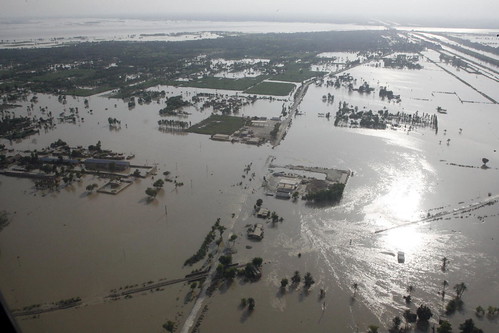As the world reels from unprecedented heat waves, droughts, wildfires, torrential rains and flooding, we're all learning first-hand that loading the atmosphere with carbon dioxide and other greenhouse gasses is costly. Unfortunately, to a large extent, those costs are not accounted for, or as economists say, they are externalized, meaning that polluters profit while society pays.
The million of Pakistanis whose lives have been disrupted by unprecedented flooding--even though Pakistan emits less than one percent of the world's greenhouse gasses--can attest to that.
Some countries, including the United States, attempt to mitigate those externalized costs by estimating the social costs of carbon (SCC) and adjusting taxes, surcharges or subsidies accordingly. For example, industries can be taxed for the greenhouse gasses they emit, ideally resulting in lower emissions, while the revenue from those taxes can be used to subsidize green energy programs.
Since official valuations of the SCC underpin climate-related policy-making by governments and industries, it's vitally important that they be as accurate as possible.
A just-released peer-reviewed study published inNature calculates that the current SCC, used by the US government for the past decade, is far too low. The study's updated calculations set the actual cost of CO2 emissions as at least $185 per metric ton (2205 pounds), 3.6 times higher than the current figure of $51 per metric ton.
In other words, policy-makers need to multiply their current estimates of the costs to society of business-as-usual CO2 emissions by a factor of 3.6, and do the same when evaluating the benefits to society of policies to reduce future emissions.
The researchers found that three factors made the biggest contributions to this new benchmark: heat-related deaths, impacts on agriculture and an updated discount rate. As much of the US reels under record-high temperatures and drought, heat-related deaths and the impacts on agriculture of climate change are self-explanatory. The researchers' use of a revised discount rate may require some explanation:
Economists use discount rates to compare current and future consequences of a proposed action, for example a loan or investment, based on the idea that money gained or lost in the future is worth less than the same amount gained or lost today. It's a more precise version of the idea behind the aphorism "a bird in the hand is worth two in the bush."
In dealing with environmental economics, the discount rate can be generalized to reflect "the rate at which society as a whole is willing to trade off present for future benefits" for example keeping fuel prices low today vs reducing temperatures ten years from now.
For the past decade evaluations of the future costs or benefits of climate-related policies have been based on a discount rate of three percent. The current research reduces that rate to two percent, a change that makes the future impacts of today's choices more salient. For example, using a discount rate of 3%, a climate-related investment of $1,000 today would have to produce more than $1,842 in benefits within the next 20 years to be economically justifiable. Using a 2% discount rate means that the same investment would only need to produce $1,497 in benefits over the same time period.
Economist Brian Prest, one of the paper's authors explains that the official discount rate of 3% was based on financial data from the 30-year period from 1973 to 2003. Updating that with data from the most recent 30 years produced the 2% figure that they folded into their calculations.
The researchers note that the actual costs to society of carbon emissions are almost certainly greater than their $185 per metric ton estimate because there are significant impacts that remain un-accounted for. Their calculations included mortality, agriculture, energy costs, and coastal impacts from sea-level rise. They plan to add impacts from biodiversity loss, reduced labor productivity, and increased inequity, conflict and migration to their future calculations.
They add that even accounting for those additional factors may not do justice to the true impacts of carbon emissions. "Other costs of climate change including the loss of cultural heritage, particular ways of life, or valued ecosystems, may never be fully valued in economic terms," they write.
In short, raising the SCC from what their research shows to be an outdated and unrealistically low figure of $51 per metric ton to a more realistic value of $185 per metric ton is just a first step, although an important one.





